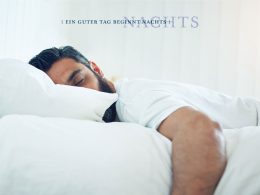Does sport improve sleep?
Sport and sleep – what can these two activities have to do with each other? At first glance, certainly not much. But that is deceptive. Because sleep and sport affect each other in several ways – and these can be quite impressive.
Sleep ensures regeneration
It is well known that the body regenerates during sleep and recovers from the physical and mental exertions of the day. Those who sleep well and sufficiently can start the day refreshed and ready to perform. However, more and more people are suffering from
Sport as a sleep enhancer
Well-dosed and regular exercise can significantly improve falling asleep and the quality of sleep. A joint study by Oregon State University and Bellarmine University in Kentucky examined the sleep behaviour of more than 2,600 men and women between the ages of 18 and 85 who exercised for at least 2.5 hours per week at a medium to high intensity.
The results were clear: compared to a non-exercising control group, the quality of sleep in the exercising test subjects improved by as much as 65%. Sport therefore not only has a positive influence on general health, regular and moderate exercise also favours a good night’s sleep.
Does exercise in the evening make sense?
However, the time of exercise is a decisive factor for falling asleep quickly and sleeping well. After all, if you boost your circulation by exercising before going to bed in the evening, you are likely to be awake at first. It is therefore advisable to do your exercise in the morning or at midday, i.e. as far away from bedtime as possible. Working people are often at a disadvantage here – at least during the week – as an intensive run at dawn is not practical for everyone.
Sports adapted to the time of day
However, you can also be active in the evening without having to worry about staying up all night. For the evening hours, we recommend more sedate sports such as Nordic walking, swimming or cycling, which challenge the body but – with moderate training intensity – do not overload it. These endurance sports benefit in two ways: they can be practised a few hours before bedtime and also have a positive effect on falling asleep and staying asleep.
Sleep as a sports enhancer
Very few people are aware that the effects of sleep and sport are reciprocal. On the one hand, sleep quality benefits from sporting activity, while on the other, sufficient and restful sleep also has a positive influence on training performance.
It is not only in everyday life and at work that well-rested people are able to perform and concentrate better and are in a much better mood, the regeneration time during sleep is also noticeable in sporting terms: General training performance is improved, the risk of injury is reduced and, for ball sports players, accuracy increases.
Customize sleep and sport
How many hours of sleep you really need for optimal training results depends on your personal needs. This is just as individual as your preference for a sport or the intensity and duration with which you train. In order to derive the greatest possible benefit from the interaction between sleep and sport, you should therefore pay attention to your body, your sleeping habits and your individual needs and adjust your sporting activity and sleep duration accordingly.














